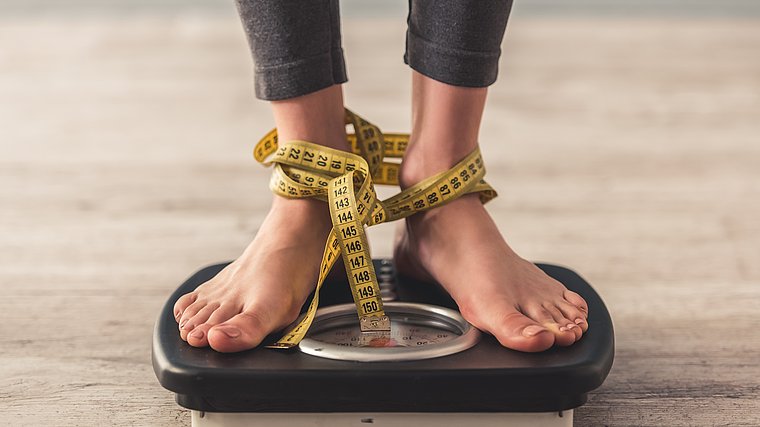In order to get rid of unnecessary body fat, it is essential to consume fewer kilocalories than the body expends during the day. How much specifically is a matter of individual consideration. This is because energy requirements are influenced by many factors, such as body weight, height, age and level of physical activity. Some of them are beyond our control (such as age or height), but there are others that we can modify. This certainly includes the level of physical activity.
Calories for exercising
Unfortunately, physical activity is the element that is most difficult to evaluate objectively. Nonetheless, it is worth the effort, as during workouts we burn the most calories and generate a significant amount of energy, which helps us maintain a calorie deficit. When estimating the level of activity done, spontaneous activities, such as climbing stairs or walking, should also be taken into account. If during weight loss your desire for such spontaneous activities has declined – this may be the first sign that the diet is too low in calories.
Deviations from the diet
And what about your diet? Are you sure you are sticking to the established diet plan? Or are you tempted to snack between meals?
If this is the case, you probably have a diet that is too restrictive or take too long intervals between meals. The feeling of hunger you experience is not an indicator of successful calorie reduction. On the contrary, it can be an obstacle to getting rid of excess weight.
If the diet we follow is properly balanced, rich in vegetables, fruit and whole grain products, the feeling of hunger will not appear too often, and thus we will better control what we eat. So maybe a modification of your plan is necessary?
Calorific drinks and supplements
Fluids are another aspect worth looking into if weight loss does not occur. Although they are not usually itemised in the diet, they are of no small importance. Of course, the best option would be to choose calorie-free drinks, i.e. water, tea, black coffee or zero-calorie drinks. However, if you can’t imagine coffee without milk, and you always drink a glass of orange juice for breakfast, be sure to include their calorie content in your diet plan. This will allow you to control the number of calories actually consumed.
Also take a look at the supplements you take. They, too, are not without influence on the weight loss. For example, creatine can lead to water retention in the body, and a protein supplement provides a sizable calorie intake (about 100 kcal without milk).

Smart weighing
How do you control your weight loss? For many people, the only tool to monitor weight loss progress is a bathroom scales. When it doesn’t show a smaller value than the day before – and sometimes it even indicates a higher number of kilograms – frustration often sets in. Keep calm!
Body weight is affected by many factors, the main ones being food content or water retention in the body. Therefore, the progress of the diet should be determined based on average weekly weight. To calculate it, the measurement should be taken at the same time, on an empty stomach, after using the restroom and after at least a day’s break from an intense workout. Only by noting down the results in this way will it be possible to determine the effectiveness of the diet used.
It is also worth bearing in mind that weight fluctuations during dieting are far more common in women. This is due to a number of hormonal changes occurring in their bodies, depending on the phase of the menstrual cycle. Therefore, weight measurement should be done in the first phase of the cycle, preferably on day 4-7. It will also be a good idea to measure circumferences and analyse body composition, which will give us information about weight, but also about components such as body fat, muscle tissue and water content.
Sleep
This is a very important part of the weight loss process! Adequate amount of sleep and its high quality help achieve the figure of your dreams.
And what are the risks of sleep deprivation? It increases the concentration of ghrelin (the hormone responsible for the feeling of hunger) and decreases the concentration of leptin (responsible for the feeling of satiety). Consequently, when we don’t get enough sleep, the next day we may feel more hungry than usual. This increases the risk of snacking and thus consuming too many calories. In addition, staying up has a negative impact on carbohydrate metabolism, which can also hinder weight loss.
Remember that increased appetite is also influenced by stress, or more specifically, by an increase in cortisol, which can interfere with the weight loss.
Give yourself time
A number of factors can contribute to stopping the weight loss, despite following a diet. The body may need a boost or “stress relief” in the form of returning from a deficit to its calorie break-even (the calorie content needed to maintain current body weight). After an initial self-analysis of aspects that may hinder weight loss in our case, it is worth consulting a dietician to verify the calorie content of the diet plan.
References:
- Gawęcki J. (ed.): Żywienie człowieka, podstawy nauki o żywieniu. Wydawnictwo Naukowe PWN, Warszawa 2012
- Jarosz M., Rychlik E., Stoś K., Charzewska J. (eds.): Normy żywienia dla populacji Polski i ich zastosowanie. Narodowy Instytut Zdrowia Publicznego - Państwowy Zakład Higieny, 2020
- Spiegel K., Tasali E., Penev P., Van Cauter E.: Sleep curtailment in healthy young men is associated with decreased leptin levels, elevated ghrelin levels, and increased hunger and appetite. Ann Intern Med 2004; 141:846–50
- Leproult, Rachel & Van Cauter, Eve.: Role of Sleep and Sleep Loss in Hormonal Release and Metabolism. Endocrine development. 2010, 17. 11-21
